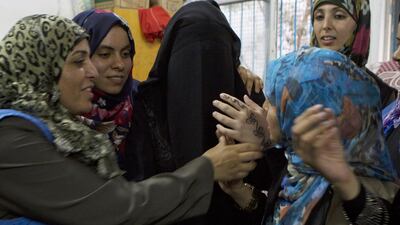BEIT LAHIYA // It was hardly the picture-perfect henna night that Heba Fayyad imagined when she became engaged two months ago.
She had wanted to spend the final night before her wedding on Wednesday several kilometres away at her family’s house in the farming village of Beit Hanoun.
That dream was obliterated on July 18, when an Israeli airstrike destroyed their home and forced the family to seek shelter at a United Nations school in Beit Lahiya that has become a makeshift camp for more than 1,000 displaced Gazans.
Still, they did their best to move forward on Tuesday, during a tenuous and temporary ceasefire between Hamas and Israel that has halted a month of bloodletting in Gaza.
After a visit to a salon, Ms Fayyad returned to the Beit Lahiya Preparatory School for Girls and stepped out of the car covered from head to toe in black, in keeping with the demands of modesty, and made her way across the courtyard to a first-floor room set aside for the ceremony.
There she parted the covering to reveal a purple dress and heavy makeup as she was greeted by female family members and camp residents.
Although most of her well-wishers did not have homes either, there were still all smiles as they came forward to offer traditional henna-night wishes such as “may God keep envy away from you” and “Qamar Arabata’sh”, meaning: “may your face beam like the light of the full moon”.
The older women commented on Ms Fayyad’s beauty. Little girls giggled.
In keeping with the traditions of northern villages in Gaza , Ms Fayyad and her future husband, 32-year-old Omar Abu Nimar, were introduced by their parents. Also in keeping with local custom, Mr Abu Nimar did not attend Tuesday’s event.
The groom’s family is from the Beach refugee camp in Gaza City, which sustained heavy shelling by Israeli warships. The camp is also where the Hamas leader Ismail Haniyeh had his home, before it was levelled in an Israeli airstrike last month.
The henna gathering was held in a library that had been converted into a makeshift clinic and children’s playroom and was festooned for the occasion with bouquets of flowers and hand-made posters of good wishes.
Ms Fayyad’s father Riad Fayyad, 47, an unemployed father of 15, wanted the occasion to be joyous, but also sombre: he asked that there be no music, out of respect for the nearly 2,000 Palestinians killed in in the Israeli attacks on Gaza since July 8, including three relatives.
“We are doing this to show that we are still strong,” he said. “I want my daughter to be married and I want Gaza to be happy for her. We must show our strength.”
Ms Fayyad’s henna party was very nearly cancelled because of her father’s concerns about the situation in Gaza and of the family.
Luckily, Rawia Baroud, a social worker for the United Nations Relief and Works Agency who works at the shelter, heard about it and decided to make the arrangements for the henna party herself.
Ms Baroud organised the appointment at the beauty salon and for congratulatory posters to be made and put up, and for guests to attend, spending US$200 (Dh74) of her own money.
“I had to do this. It’s God’s will,” Ms Baroud said when asked why she took it upon herself to throw Ms Fayyad a henna party.
The two had never met until Tuesday.
“I don’t know her, but she is my sister,” she said.
hnaylor@thenational.ae

